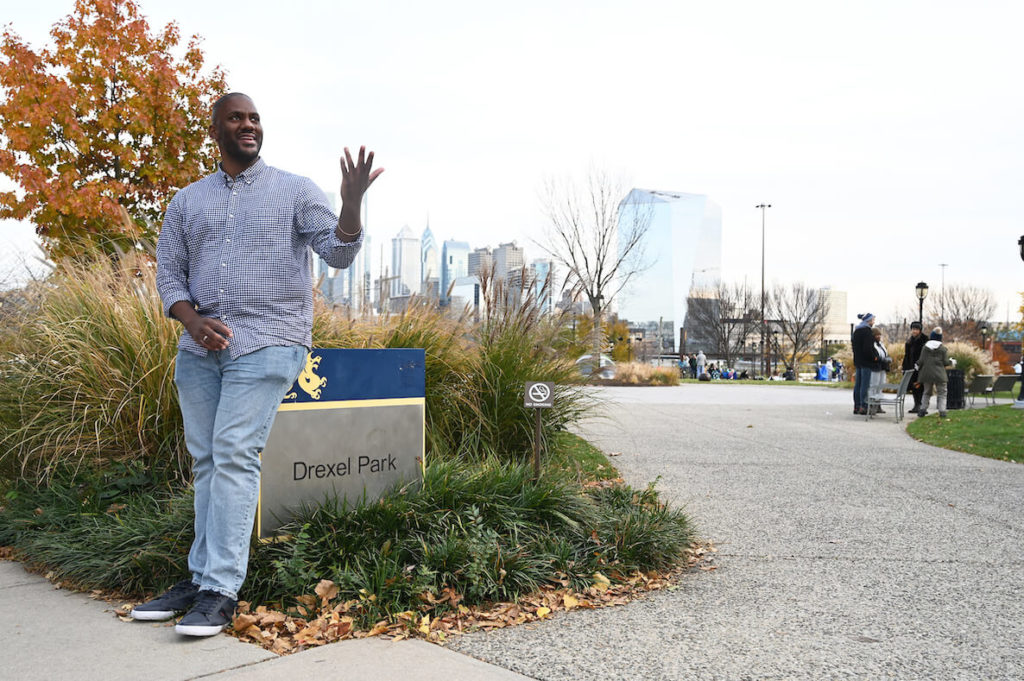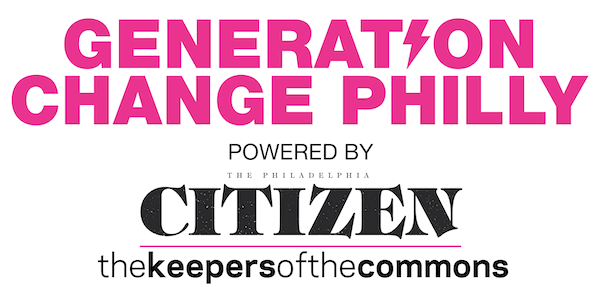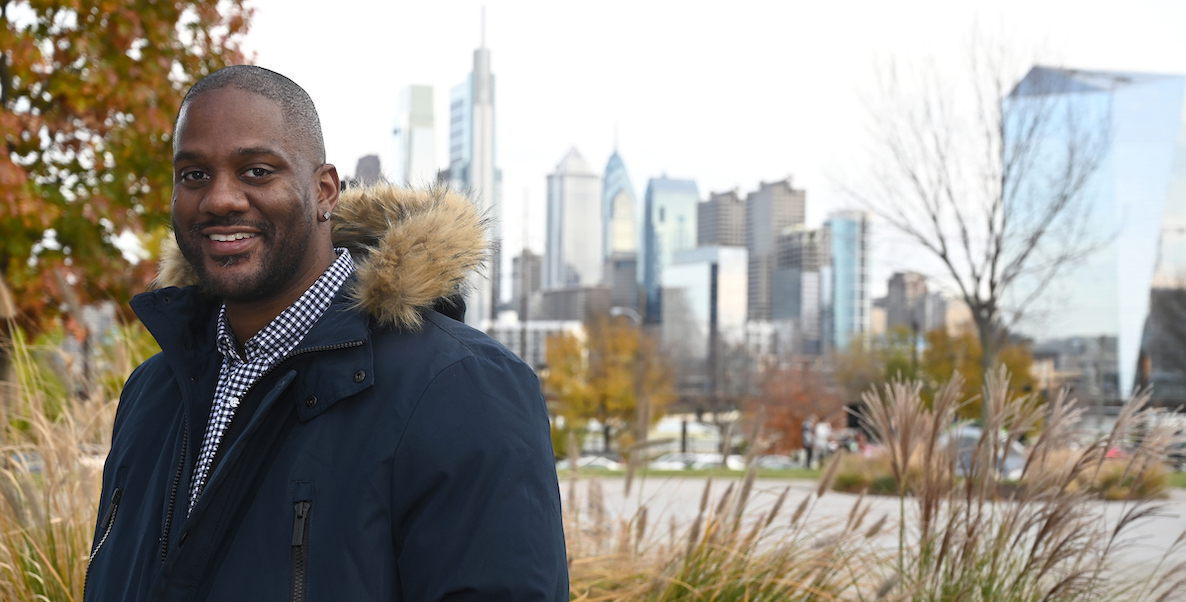It’s hard to know where to start a story about Michael O’Bryan. The warm-voiced 36-year-old is — self-admittedly — a talker, and a conversation with him yields so many insights (personal insights, political insights, professional, philosophical, physiological, Philadelphian … you name it) that your head spins with possibilities.
You could begin with his beginnings. You could start way back when he was Mike the theater kid, an actor and music major who grew up and used the arts as a way to build vital relationships with and bridges to young people, specifically young people who’d experienced trauma.
Or maybe you start there, with trauma. You’d note that what we mean by trauma is any threat to a person’s physical or emotional well-being, creating feelings of helplessness or terror that shape the way we understand the world. O’Bryan experienced trauma as a Black child growing up in an impoverished neighborhood, with many of the challenges that come with that; as a grown-up, he threw himself into the work of mitigating the damage trauma wreaks in so many lives.
O’Bryan’s focus is human well-being — how to understand it, why to care about it, and ways to rehumanize all that has been dehumanized because it’s surrounded by pain or powerlessness or practices designed to dehumanize.
This work has led him through many roles, including running the youth programs at Salvation Army’s Red Shield Shelter, facilitating the U.S. Attorney office’s trauma-informed care initiative, working with residents in Project Home, directing the youth and learning programs at Village of Arts and Humanities. He’s worked with Mural Arts Project, with Project Ceasefire, with the New Freedom Theater. And over the course of it all, says ImpactPHL Executive Director Cory Donovan, he’s developed a reputation as “a sort of savant in trauma-informed care and management.”
You could also conceivably begin there, with the management aspect of his life, how he’s spent years studying organizational culture and system dynamics, and where those things intersect with the trauma and resilience of human beings. You could explain how, at a moment when every organization in the world seems to be focusing on Diversity, Equity and Inclusion (DEI) as an end game in and of itself, O’Bryan sees DEI work as an ingredient in something bigger, something more.
His focus is human well-being — how to understand it, why to care about it, and ways to rehumanize all that has been dehumanized because it’s surrounded by pain or powerlessness or practices designed to dehumanize. His equity work in this realm is radically multi-disciplinary, meshing cognitive science (for instance: what trauma and stress physically do to a brain and its development) with social science with empathy with concepts of identity with ideas about the future of work — and, also hey, also helping people flourish in their jobs, improving workplaces and even, sometimes, the bottom line. So: More than your run-of-the-mill DEI.

This is where we find O’Bryan now, working with these ideas he’s cultivated over a lifetime in his many roles, including his latest: entrepreneur. With his four-year-old design-strategy firm, Humanature, O’Bryan aims to help leaders in businesses, nonprofits and workforce development transform the way they “understand and support human development, interaction and performance.” Clients include or have included Temple University Hospital, the Federal Reserve Bank of Philadelphia, The United Negro College Fund, and Strada Education Network, to name a few.
His trainings and workshops are a means to a better organization, yes; on a larger scale, they’re a means to a better, more inclusive, equitable society.
“Mike is a thought leader,” offers Keith Bethel, the former C-suite Aramark honcho-turned-CEO of the Philadelphia Equity Alliance. What struck Bethel when he first met O’Bryan is exactly what you hear over and over about the guy — he questions conventional wisdom about empathy, equity and structures that aren’t working how they’re supposed to; he zeroes in on human behavior and biology; he aims to shift “how we act and think, even the way we talk about equity and talk about people.” In fact, Bethel says, O’Bryan’s perspective felt so compelling that the Equity Alliance is tapping him to help them tackle the city’s seemingly intractable racial disparities in jobs, in economic health, in physical well-being.
It’s not just the Equity Alliance, either: O’Bryan and his ideas are gaining more and more traction in unexpected spaces, from Penn to Philly’s Department of Public Health to Triple Bottom Brewing. (He’s also, for the second year in a row, a judge for The Citizen’s Integrity Icon contest.) That’s why he felt like such a good fit for the Citizen’s Generation Change Philly project, our ongoing series in collaboration with Keepers of the Commons about visionaries, disruptors and change-makers. Because, like Donovan noted, “Michael O’Bryan is out there helping people who make important decisions think about things in a new way.”
A life shaped by experience
Growing up in Hartford, Connecticut, O’Bryan was the youngest of three boys, the son of a mother who had an extraordinarily hard life as a young person, who was determined that her sons would have opportunities she didn’t. They’d visit the library constantly, he says, reading and listening to records for hours. “It was a gift,” he says.
This was his first and biggest influence, he’d tell you: his mom, who was so devoted to him, who taught him how to be independent, who buffered him from “so much shit that I didn’t realize all that was going on and happening around us.” They were poor; life wasn’t easy where they lived. He saw addiction; he saw violence. He was twice caught in shootouts.
At 11, he started school in a different neighborhood, the tonier West Hartford. It was a revelation, a first taste of being an outsider. “Until then, I didn’t know that Connecticut was predominantly white,” he says. “It was the difference between going to school in Lower Merion and North Philly. I sat with my hands over my face for two days. Like, Where are the Black people, the Spanish speakers? It was wild.”
There were other early influences in his life, too. There was Looking In Theater, the troupe O’Bryan joined as a young teen, which performed pieces about teenage social issues — eating disorders, racism, addiction — and involved interactive dialogue with the audience. Before he ever tried out, he says, he’d watched the Looking In plays; he saw how the performances affected his fellow students, inspiring conversations and trips to the guidance counselor. “It was the first time I really understood the power of art,” he says.
“When you grow up poor, it’s the invisible stuff that you don’t know how to enumerate as part of the experience,” he says. “You feel like everything can get robbed from you, and the pain of that loss hurts so much that you don’t even try, almost. You learn that dreaming can be a costly activity — it’s a spiritual cost, a psychological cost. And these things have an impact on your neurological development, on the scaffolding of development over time.”
He went on to attend a prestigious performing arts high school, a childhood dream that almost didn’t happen. He’d tried out and been accepted, but paying the tuition was out of the question for his family. So he’d given up on it. Then, the day before school started, he got a call from the head of the school’s theater department: An anonymous donor had agreed to pay his way for all four years. “A movie moment,” as he says. His mom broke down in tears. He just stood there, unable to process it.
This, too, was a moment that would shape the man he’d become, planting seeds for realizations about how many things that shape us as humans are out of our control, how we all have no choice but to respond to the world around us, whatever that world looks like. How the kindness of others can affect us, and how people might (or might not) invest in us and “put up with our shit,” as O’Bryan says so many of his teachers did. How something as common as living in poverty affects your brain.
“When you grow up poor, it’s the invisible stuff that you don’t know how to enumerate as part of the experience,” he says. “You feel like everything can get robbed from you, and the pain of that loss hurts so much that you don’t even try, almost. You learn that dreaming can be a costly activity — it’s a spiritual cost, a psychological cost. And these things have an impact on your neurological development, on the scaffolding of development over time.”
After high school, O’Bryan knew he wanted to study what he’d gotten a taste of through Looking In — art and music, creativity and healing. And he knew he wanted to do it in Philly, where, unlike Connecticut, “the Black art scene is really a thing.” He went to University of the Arts, where he studied those things and also everything else he could get his hands on: Buddhism, psychology, anthropology, neuroscience. “I needed art,” he says. “But I also needed more than art.”
After graduation, he took a teaching job in Florida with a nonprofit called enFamilia, which worked with the children of migrant farming families, many of whom were deeply poor, struggling, and suffering any number of indignities in a world that forgot or excluded them. “It was a red pill/blue pill moment for me,” O’Bryan says. The work showed a new level of human voicelessness, terror and resilience; it all burned into his consciousness.
“It was like either you’re going to bury your head in the sand and act like the world is not what you’re discovering it to be. Or you’re going to do something about it.” He knew then, at 22, which he would choose. “Though I didn’t know what that something was.”
Back in Philly he set about finding it, starting down his path as a trauma-informed care practitioner. From a variety of nonprofit perches over the years, while working in the middle of intersecting worlds — art, wellness, healing, social science, community-building, system dynamics, history, human development — O’Bryan earned a certification in childhood trauma studies from Jefferson University, working with some of the biggest names in that academic space.
As his research and experience and expertise snowballed, his work was earning him attention and accolades — among them, child Advocate of the Year in 2014, one of the Knight Foundation’s “national emerging city champions” in 2017. In addition to his official roles, he’d also became a sort of de facto consultant, the go-to guy for organizations looking for, say, help designing programs for youth, or wanting to better understand the trauma of clients they were serving, or trying to understand what advice from one DEI consultant or another actually looked like in practice. “The clean-up contracts,” as O’Bryan calls them, with a little laugh.
O’Bryan questions conventional wisdom about empathy, equity and structures that aren’t working how they’re supposed to; he zeroes in on human behavior and biology; he aims to shift “how we act and think, even the way we talk about equity and talk about people,” says Keith Bethel.
He was busy, balancing lots of work (including his full-time job at the Village of Arts and Humanities), but given the demand he was seeing for this type of teaching and perspective, O’Bryan decided to launch his firm. Still, it wasn’t until 2017, when he was named an Innovation Fellow with Drexel’s Lindy Institute of Urban Innovation, that today’s iteration of Humanature really began to take shape.
The late civic giant Jeremy Nowak, a Distinguished Professor with Lindy (and The Citizen’s founding chairman), was immediately taken with O’Bryan’s research around income access, workforce development and the barriers around those things for young Black people. The two became close; Nowak encouraged him to think bigger. It was time, he said, for O’Bryan to take his life’s work and endless research and scale it — to productize, monetize, and “take all that stuff up there in your head, and get it out into the world.”
And that is exactly what O’Bryan is busy doing now.
Changing the world through empathy
Humanature is on a roll lately, in part thanks to Covid, which forced O’Bryan to think and create more digitally than he otherwise might have. With a small team of colleagues and funding from the Neubauer Family Foundation, he unveiled something called Empathy Lab, a learning tool for professionals and organizations “interested in driving change in diversity and inclusion and racial and social equity.”
For 6 months, Lab participants have bi-weekly sessions that center around, well … humanity. More specifically? The importance of recognizing our shared humanity, and how that plays into our economy and our organizations; what happens when we dehumanize our workers and workforce; and how we can shift frameworks, policies, practices, lexicon, and thinking to design and redesign for humanity — all humanity, crucially, and particularly the people who have been marginalized and left out.
Sound a bit … heady? Sure, says Joy Smith-Groomes, director of training and staff development for JEVS Human Services. She participated in the pilot Lab (along with others from Project Home, Comcast, the Economy League, and more), but also knew O’Bryan from previous trainings. And what you quickly see about him, she says, is that “he has an ability to take very deep concepts and break them down, make them relatable.”
Most everyone who knows O’Bryan says something like this. Tess Hart, co-founder and CEO of Triple Bottom Brewing, hired O’Bryan years back as a “thought partner” when she was creating the mission-driven brewery. She says that even beyond his expertise — that mix of academic and the practical street cred — that’s his gift: Taking theory and “putting it into practice in operating a business.”
The end goal of O’Bryan’s new venture is a fresh understanding of people in all their complexity — hence, Empathy Lab — and the ways in which that understanding opens up a more inclusive, equitable, flourishing workplace. It’s possible to elaborate here on all of the philosophy, action points, and ideas about what it means to be able to bring “your full humanity” to work, but that’s O’Bryan’s job, and anyway, the point is, people who have experienced the Lab say it’s different than anything they’ve done before.
Meantime, with backing from the Robert Wood Johnson Foundation via a $238,000 grant, O’Bryan has a second Empathy Lab pilot in the works, and he’s also developed a shorter, tighter version he’s calling Empathy Lab Mini, plus a “train the trainer” program, all in service to getting the ideas out into the world.
That’s the thing about O’Bryan: One conversation with him, and you see potential everywhere. Within individual people. Within the possibility for changing minds. Within the possibility for changing rules, and systems, and interactions, and hiring practices, and thought processes.
As is his way, he has a few other things going, too. During the pandemic, the United Negro College Fund (UNCF) tapped O’Bryan to design a workforce development framework that would help guide and inform a coalition run by Strada Education Network. The coalition, packed with power players from the business and education worlds (McDonalds, Amazon, Wal-mart, Arizona State, UNCF) aimed to examine the impact of Covid, and help leaders envision a way forward. Post-coalition, O’Bryan is continuing to work with UNCF.
Also? He co-teaches a class at Penn in city planning; he’s on faculty at the Curtis Institute; he’s a Corzo fellow; and he sits on multiple boards, including Samuel S. Fels Fund and the Philadelphia Cultural Fund. Humanature is also in a second-year pilot of a project designed in partnership with Philly’s Department of Public Health and the Lindy Institute: The new and expansive Future Folklore program creates paid social-practice arts fellowships for 19 to 26-year-olds in Philly.
On top of all of this, there’s also the Equity Alliance work on the horizon. Details haven’t all been hammered out yet, but just take a look at who’s involved with that Alliance — Lindy, CHOP’s Madeline Bell, Temple’s Joanne Epps, labor leader Ryan Boyer, Drexel’s John Fry, Della Clark from the Enterprise Center — and you can easily see the hope and potential there, in terms of expanding O’Bryan’s reach and impact, the reach and impact of Empathy Lab.
That’s the thing about O’Bryan, actually: One conversation with him, and you see potential everywhere. Within individual people, including people struggling with trauma that feels insurmountable. Within the possibility for changing minds. Within the possibility for changing rules, and systems, and interactions, and hiring practices, and thought processes. And in a city not known for change and a city in desperate need of it, so much fresh potential really does make your head spin with possibilities.

The Philadelphia Citizen is partnering with the nonprofit Keepers of the Commons on the “Generation Change Philly” series to provide educational and networking opportunities to the city’s most dynamic change-makers.
![]() MORE ON PHILLY CHANGEMAKERS
MORE ON PHILLY CHANGEMAKERS
Header photo: Michael O'Bryan, founder of Humanature | By Sabina Louise Pierce



